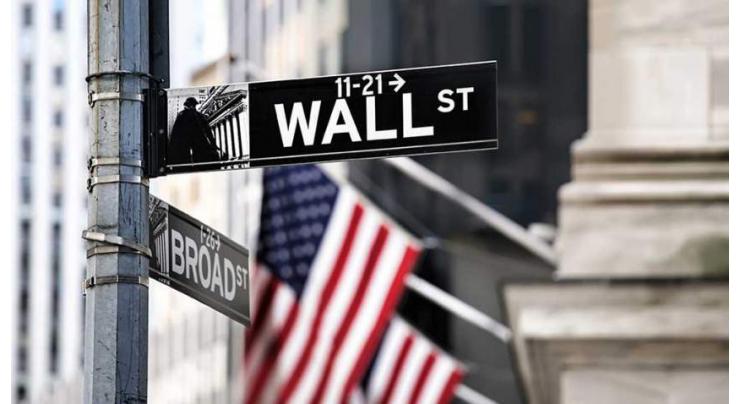
- Home
- Business
- News
- Wall Street Backs Off From Bear Market Territory on Bargain-Hunting After Stocks Rout
Wall Street Backs Off From Bear Market Territory On Bargain-Hunting After Stocks Rout
Mohammad Ali (@ChaudhryMAli88) Published May 23, 2022 | 11:27 PM

Wall Street backed off from the cusp of bear market territory as bargain-hunting investors lifted US stocks from last week's battering despite sentiment remaining fragile on fears of a potential recession
NEW YORK (UrduPoint News / Sputnik - 23rd May, 2022) Wall Street backed off from the cusp of bear market territory as bargain-hunting investors lifted US stocks from last week's battering despite sentiment remaining fragile on fears of a potential recession.
The three major stock indices on Wall Street - which included the S&P 500 for the top 500 US stocks, the broad-based Dow Jones Industrial Average Index and the technology-heavy Nasdaq Composite Index - were up almost 2% by early afternoon Monday from Friday's drop of nearly 4%.
The S&P 500 was at 3,965 points, up 1.6% on the day. On Friday, it was at 3,901, flat on the day but down 20% on the year. In general market terminology, any asset down 20% from its most recent high or from any particular period like a quarter or year-end is defined as having entered a bear market.
US stocks as a whole fell for a seventh straight week last week - their longest losing streak since the dotcom bust of the mid-1990s - amid fears that there could be a recession from the Federal Reserve's determination to hike interest rates aggressively to beat the worst US inflation in 40 years.
"Today is a bounce from oversold conditions over the last couple of months," Jeff Schulze, investment strategist at ClearBridge Investments, said. "The markets are looking for a tradable bottom here in potentially a bear market rally."
Schulze attributed the rebound to bargain-hunting, particularly in stocks of banks, which he said would be resilient enough to withstand any economic shocks from Fed rate hikes.
"Banks are in oversold conditions," he said. "They tend to be very economically sensitive and with the data so far, they are actually holding up. There's some optimism that there has been an overpricing of negativity into the earnings potential for banks over the course of the next couple of quarters."
The Federal Reserve has said it will raise interest rates non-stop and even slow the US economy if necessary to bring inflation down from 40-year highs.
After contracting 3.5% in 2020 from disruptions forced by the coronavirus pandemic measures, the US economy expanded by 5.7% in� 2021, growing at the fastest pace since 1982. But inflation has grown just as fast as the economy and faster, with some price gauges showing growth of as much as 8.5% on the year.
Since this year began, US growth has been on a weaker trajectory, coming in at a negative 1.4% in the first quarter as the Russia-Ukraine crisis led to runaway inflation in food and energy prices.
If the economy does not return to positive territory in the second quarter, the United States will technically be in recession going by the definition that it takes just two negative quarters in a row to make up a recession.
Related Topics
Recent Stories

BISP embraces E-procurement: launches inaugural tender

Modi govt broken all records of oppression to win elections: President AJK

PM for further strengthening economic, trade ties with Turkiye

Administrative machinery actively checking price, weight of roti/naan: minister

Advisor asks tourists to avoid visiting Kaghan during current rains

Business community indebted to Ahsan Zafar for his unprecedented services: Yousu ..

Three Filipinos dead in UAE floods: officials

DC Larkana chairs meeting to review strategy for anti-Polio drive

Registration process under BISP continues in Sargodha

QAU announces scholarships for KP students

Prisoner commits suicide in Timergara Jail

RCB takes action against selling expired food items
More Stories From Business
-

BISP embraces E-procurement: launches inaugural tender
52 minutes ago -

Business community indebted to Ahsan Zafar for his unprecedented services: Yousuf Rajput
56 minutes ago -

China auto sector steps up Europe push with Spain plant
52 minutes ago -

Condolence reference held in memory of FBR's officials
2 hours ago -

Health activists ring alarm bells over 10-stick cigarette pack
2 hours ago -

Karachi receives maiden direct flight of Azerbaijan Airlines from Baku
3 hours ago
-
PSX turns bullish, gains 619 points
3 hours ago -

Rupee bounces back; gains 13 paisa against dollar
3 hours ago -

Partners join hands for alternate use of marble, granite slury
3 hours ago -
Tokyo's Nikkei index tumbles 3% in morning trade
5 hours ago -
Weekly inflation falls by 0.79 percent
5 hours ago -

IMF Officials assure support to Pakistan’s economy
6 hours ago














